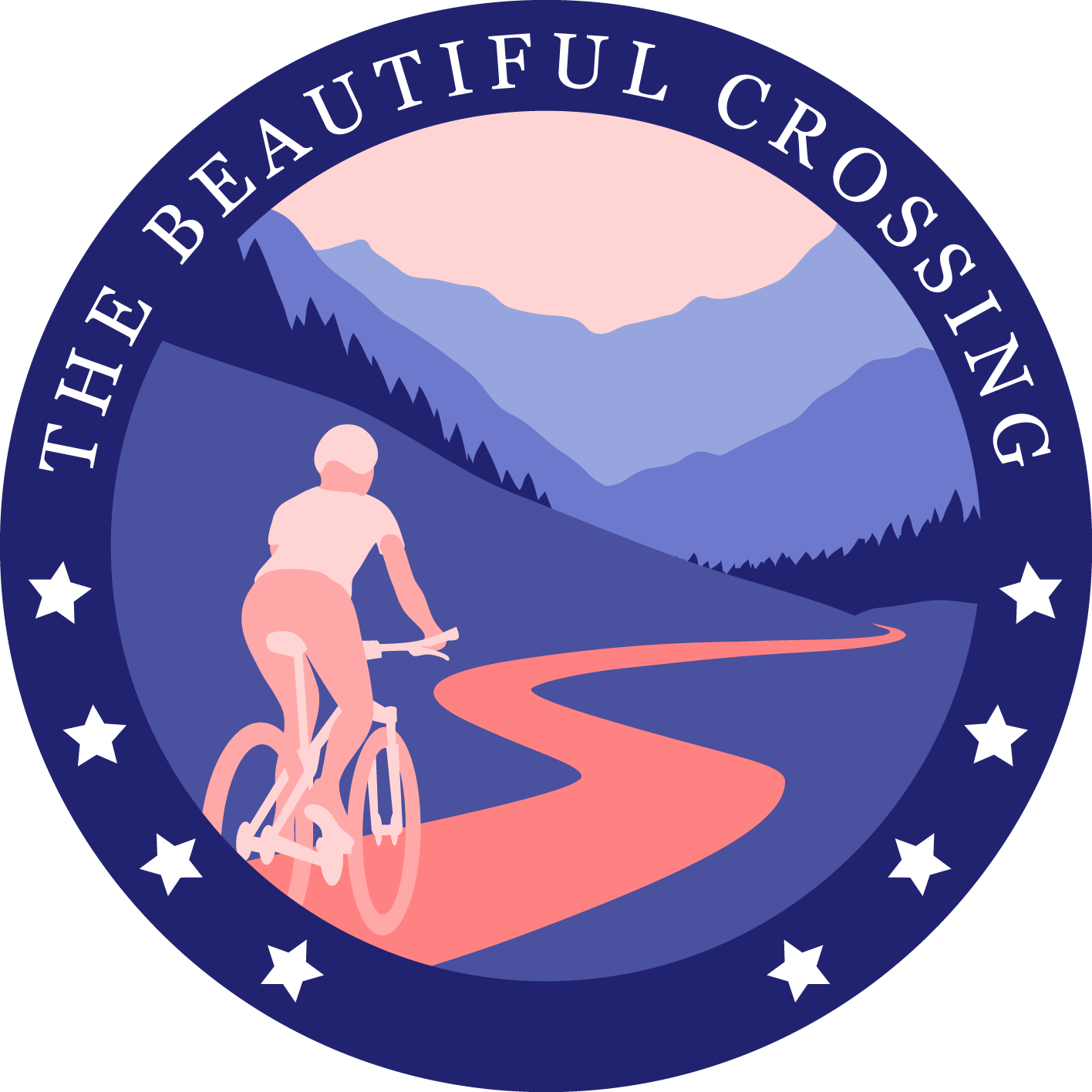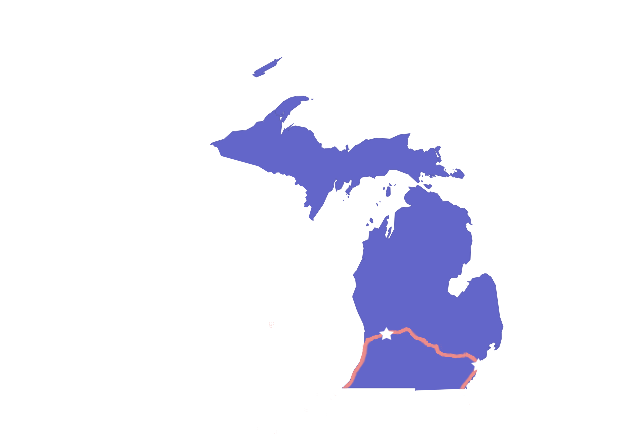
Michigan
ADENG
Grand Rapids, MI
“I’m so proud that I own my degree, but the student loan I have is a heart break. That thing right there is terrifying my family so much, my foster parents and me myself. Sometimes when I look at it, it puts me into stress. I’m like, this money, where am I going to get it to get it paid? I’m working with a nonprofit, there’s a lot of stuff that I have to work on so hard. To get the student loan forgiveness. There are some time that I feel like it’s not going to get there. God is the only one who knows. Looking forward, I’m looking for my kid to pursue the education without financial issue like what I have.”
Photo Credit @joy.bittner
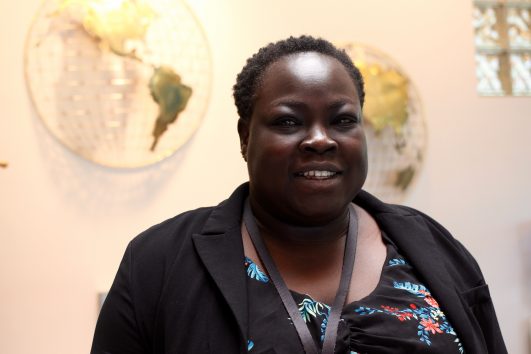
I am originally from Southern Sudan. I am one of the lost boys and lost girls that resided in United States in 2000s. I’ve been in the United States for 17 years and half right now. That’s where I’m originally from. Back then it was called Sudan. Right now, the country divided into two. So I’m originally from Southern Sudan.
First day in the United States – I came here in 2000, December 23rd – and it was really snowing day, big snow! When I came here I was a 14-year-old that had never seen snow before. They give us the orientation saying that there was something like ice, but we didn’t know that. The thing that they did in Kenya that they bring a piece of ice to feel it with the hand. But over a year, it looked like sugar was on the floor. It looked like a flour on the floor. So we exit from the airplane. We find all of Bethany Christian Services people waiting for us, plus the foster parents. The wrong part, and what made me remember this, was the size of clothes and shoes and everything that they brought to the airport for me. They bring everything as a 14-year-old girl. They didn’t know how old she is or the size of the shoes she wear. So finally they came and when I put on the jacket, it could not even go all the way to the arm. When I put the shoes on, they are like 14 year old in America girl, not a Sudanese girl. I was wearing flip-flops. So they say that they have to go to the grocery store. My parents live all the way about 45 minute away from the airport. So they wanted to the grocery store to get me shoes and a jacket because it was so cold. So it was snowing, stormy day. Like I said before. And I said, “Never mind, I will just manage it. I will get into the car like that.” So they said, “Are you sure?” And I said, “Yeah.” When I put my feet in there, I was freezing! To the point I could not talk anymore! Then I went down and touch it. I thought that it would not be that cold. So I remember my mom saying that, “I hope she’s not going to be shocked.” So I said, “If this is how is going to be – Oh, we better buy some stuff so I could go down or leave the house! It’s really far away and don’t want to put my feet in it no more.” So we stop at Meijer’s, buy some shoes and jacket, then we went home and I was totally fine. A couple of days later, I overslept for 18 house because I had never been in this cold weather. They thought something was wrong with me so they called the ambulance and everything because I couldn’t wake up! They come and poke my hand and find me and I’m fine, just sleeping. It’s the time changes and all that. So I quite remember all of my first day. It was a challenge, but it was great.
I’m still with my foster parents. We had a little bit of a gap when I was in high school, but I went back to them. So I’m still with them right now. They are the ones taking care of my boys during the day when I’m working… So it’s challenging, because you bring this stranger into your house that you don’t know. It’s challenging to them, and it’s challenging to us. And then, here we are, we grow where there is no parent. Where you in the refugee camp, you independent as a child. And you step in America, and you have somebody that you call parent. So it is quite a little bit challenging and much stress, and we have a lot of culture shock and language barriers. Those kind of stuff was killing us so much not to make us getting along with foster parent, but you work it out because if you are 14 years old, where could you go?
The thing I like in the United States, one of the things that you grow up in a freedom life. You are in a secure area that you don’t have anyone that will harm you. You’re not hearing any gunshots anywhere, maybe some places are, but at least if you make a choice to be in that situation of hearing a gun shot in America, but I don’t see any big crime people moving all the time – you worry about where you’re going to sleep, where your children are, what your children are going to eat tomorrow. If your children will be in the same life that you were in before. Security is one of the key things because if you are hungry and don’t even sleep good at night, you will not be able to focus on anything. For example, if the child is always scared of something that is going to hurt you, you’re not eating well… How are you going to focus in school? So those things in America – I love it to be here, so my boys will have a secure place that they could call home. They will not be worried about going to school tomorrow, and that school will be destroyed and they will sit home for another two week or so. And then when they try to go back to school again, they war will start again. So I love that part. My kids are growing with no difficulties.
I have a four-year-old and a two-year-old. He just turned two last Saturday. They always dream to be engineers. Which if you go to my home country right now and find a four-year-old, only dream that they have is like, what am I going to eat tomorrow? They don’t even have a dream of, am I going to go to school tomorrow? What am I going to become when I grow up? They don’t have that question. The only question they have in their mind is they don’t have nowhere to eat, nowhere to sleep. You lost your parent also. So, every time when I come home, and I say, “What did you learn from grandma and grandpa today?” “Oh yeah, we learned this and this! And mom I can’t wait to grow up to be an engineer like Uncle Benjamin and Uncle Daniel!” I’m like great! I didn’t even have that dream at all in my life, but here you are – I’m happy that you dream.
I’m so proud that I own my degree, but the student loan I have is a heart break. That thing right there is terrifying my family so much, my foster parents and me myself. Sometimes when I look at it, it puts me into stress. I’m like, this money, where am I going to get it to get it paid? I’m working with a nonprofit, there’s a lot of stuff that I have to work on so hard. To get the student loan forgiveness. There are some time that I feel like it’s not going to get there. God is the only one who knows. Looking forward, I’m looking for my kid to pursue the education without financial issue like what I have. Five years from now and so. God blessed me with a good foster parents, like the way I said before. I was not able to buy a house, because of that student loan. But my parents help us. My husband, on the other hand, has a student loan because nobody educate us in the beginning. When you go to college, student loan is something that going to be in your life. So we both have student loans that we cannot pay back because we are not getting a good job. I question myself, why are we not getting a decent job to pay our student loan back? Is it because of language barriers? Is it because we are not American? Is it because we didn’t grow up where the money are? So many questions are in there! But when I find other Americans are going through that too, I kind of calm myself down and I say this solution will be solved later.
ADAM
Grand Rapids, MI
“First of all, I lived for my last three years before coming to the United States was in Turkey, Istanbul. So I worked over there illegally because I didn’t have work permit… Authorization to work was very precious to me. I got benefits from the DHHS for like four months. Then I got my first job. It was a part time. When I received my first salary, it taste different. Yeah, it taste different than the benefits I was getting as help from the government. Then I got offered this job as a full time job… Yeah this moment, I will never forget.”
Photo Credit @joy.bittner
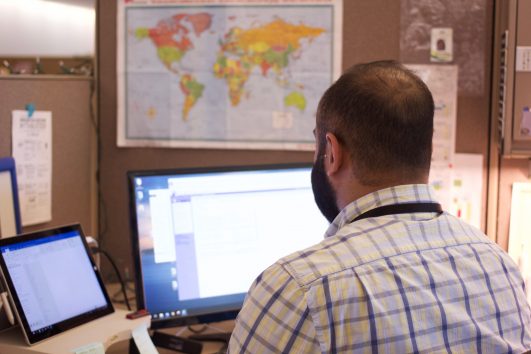
Well, I am originally from Syria. I fled from Syria in 2013 to Turkey, and I lived there for three years. Within these three years I applied to the United Nations office and then the granted me as a refugee. Then in 2015, they told me that you will be resettled in – to the United States. In 2016, they called me and told me, “We booked you a flight”- and they brought me here. But during this time, I got a lot of interviews and also background checks and this stuff. And then in the end, they booked my flight and brought me here. So I live now in Michigan since June, 2016.
Okay, there are a few things I want to talk about. First of all, I lived for my last three years before coming to the United States was in Turkey, Istanbul. So I worked over there illegally because I didn’t have work permit. And I felt like, whatever I am doing I am just getting my salary and there are no benefits, there is nothing. I mean there is no retirement plan if I got old there. Nobody would help me, yeah. So the first thing that happened when I came here, I received my work permission. So I felt like, okay this country accepts me to work here! And also when we enter the United States with the travel document, they stamp on the travel document that I am authorized to work from my first day – and it’s indefinite. Authorization to work was very precious to me. I got benefits from the DHHS for like four months. Then I got my first job. It was a part time. When I received my first salary, it taste different. Yeah, it taste different than the benefits I was getting as help from the government. Then I got offered this job as a full time job, it was – yeah, I don’t forget that moment when my supervisor – not my current one, the previous one – offered me this job. It was like, “You are offering me?” I thought you would tell me, “Yeah, you got the job.” He was offering me the job, and I was, “Yeah, I want it. I will take it.” Yeah this moment, I will never forget. Yeah, as you said, the first year is full of things that you feel are changing your whole life. From a new atmosphere that you move to, from a government that respects you, from paperwork – I mean, I have a social security card. I have work permission, and now I have a green card. I mean, in the future I will be a citizen! I feel – I felt like a human once again, because the past three years before coming to the United States, it was not good.
You know, we like to watch hollywood movies, and all the time we thought that the United States is just like downtown New York or downtown Chicago. This is what we thought. When I came here, I saw just like no high buildings. The highest building is just two floors. And very long streets with nobody in the streets. It was not meeting my expectations, no. Yeah and also, all of my life they told me that in the United States, time is precious. If you lost a minute, it’s precious – you will not have it again. So you come here to Grand Rapids, and the public transportation – the bus system – if you miss it, you need to wait for 30 minutes to get the second bus. So it’s like, okay time is precious and I am losing 30 minutes waiting for the bus? Yeah, that was a little bit… down!
Yeah, I want to say to American people that to be a refugee is not an option – it is something I didn’t chose. I had to go out of my country because of the war, just to be safe. Just to be alive And then the second country shows to me – well actually no, the United States shows to me that they want me better. They did a lot of interviews with me, and they brought me here. So the government chose me to be a New American, let’s say.
So I was talking with my roommate about will we go back after the citizenship? Or will we go somewhere else after getting the American citizenship? I don’t think so. We – I mean – If the war is still there, I will not move to anywhere because I am tired of moving. I am tired of changing my address everywhere, packing my stuff and unpacking. And find a new job, and find a new friends. Yeah, I am the kind of person who is very social and I consider my friends are my family everywhere I go. So I don’t like to change my family now here in Grand Rapids again. And believe me, the moment the war will finish back in Syria, I will go back. Yeah, I want to be next to my family – I want to be next to my friends. And I am sorry, I don’t want to die here. I don’t want to die alone here – I want to die next to the people that I grew up with.
ADELE
GRAND RAPIDS, MI
“The name refugee doesn’t disappear – even if after years and years and years, they will still look at you as a refugee. They don’t see you as an American. So for me, to be an American is leaving the refugee name behind, because yeah I was a refugee – but then I am an American now… Being an American means that you are a part of this country. You are just like anybody else that you see across from you. You are just like anybody that you see on the road. Anybody that you see in America. So yeah in short, for me being an American is people realizing that we are all the same.”
Photo Credit @joy.bittner
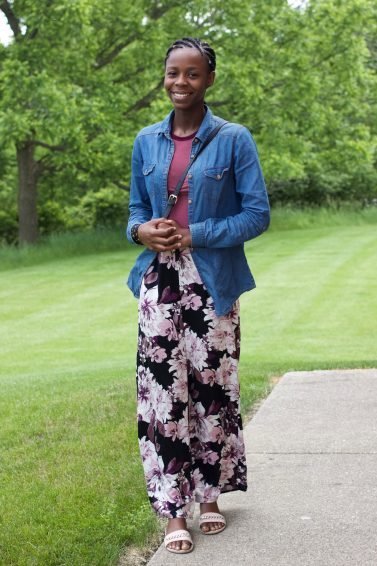
I’m from Tanzania. I was born there, but my parents are from Congo. So they came from Congo in 1996-ish, because of the war. So they ended up going to a refugee camp in Tanzania. It’s called Nyarugusu Camp. Yeah, after two years – I think – my mom gave birth to me in Tanzania in the refugee camp, in 1999. Yes, I was born in Tanzania – me and my two other siblings. We have an older sister who was born in Congo.
The first people I saw when I came here, it was people from this one church – I don’t remember the name of it. But it was people, volunteers, from the church who came to welcome us. His name was Jimmy? I don’t remember, yeah… He came and welcomed us, and then since we were told we were so tired, me and my siblings, he said he was going to take us to a restaurant. We didn’t understand English, so we were just following him wherever he goes. We went with him. So he took us to McDonalds. I didn’t know McDonalds at the time, but now I know it was McDonalds. So we went there, and he gave us ice cream, french fries, and all this stuff, but we couldn’t eat it because we were not used to the food. So we just stared at the food, and we didn’t even eat it. So my mom got mad because she thought it was a bad sign of like because the guy gave us food but we didn’t even eat it. So she was telling us in my language that, “You guys are supposed to being eating the food, because the guy gave his money and stuff.” So we were forced to eat it! So we ended up eating the stuff, but we didn’t really like it because we were not used to the food. So the first time in America was I went to McDonalds. After the airport, we went to McDonalds – and then I ended up not eating anything, because I didn’t like anything. Yeah.
I have lived half of my life in Tanzania, and a lot of the stuff that I see here – like school related and a lot of stuff opportunity related – they were not in Tanzania. So I like the opportunities that are here. I also like how everybody here is really free, and like you can – everybody, you can do whatever you want as long as you are not hurting anybody. You are free! And the freedom of each and everybody to live however they want. I like that. In some countries in Africa, you have to be… there is rules that you have to follow, some rules that don’t even make sense sometimes but you have to follow them. So I like that about the United States. You can live however you want. There is the bad and the good side of that, but then still you have the freedom to live. Yeah, I like that about the United States.
My Dad used to tell us a long time ago that, “Words can hurt, and words can build.” So with the Freedom of Speech that we have in America, there’s a lot of people who just because you want to say something – even if it is something that you are not supposed to say – but since there is freedom of speech, you just say it even if it’s hurtful and its damaging. You just say it cause America – freedom of speech, yeah So as I said, you can do anything that you want – and that comes with the good and the bad. So with that, you can do things that are unacceptable, but then in the name of having the freedom of speech and all that stuff, you just do it. And some people choose to be silent about it, and others speak about it, but majority keep silent.
As I said, I wanted to become a pilot before but then I changed my mind. I wanted to do something else to give back, and with that I want to work with – if God helps – in the United Nations. I want to do something to help refugees too because I know how life is, because as I said I was born there and I lived there for 12 years. Yeah, I know how it feels. I know how you sleep with an empty stomach – how it feels! So yeah, I feel like it will be my way of like saying thank you and giving back. So in five years, I want to do something… I want to be working with a lot of stuff with refugees and just helping people. Even when I was a little kid, my Mom would give me food but then once I see a person – another, maybe a neighbor who hasn’t ate since morning, I would just take my stuff and give them. And my mom would be like, “You have a really different heart.” I was like, “Yeah, I am not going to sit here and just look at the person suffer. I would rather stay like this but then give the person who is suffering.” So with that I want to do something to help in anyway. I just wanna help a lot with the refugees and immigrants. Yeah, in five years I want to work with the United Nations.
The name refugee doesn’t disappear – even if after years and years and years, they will still look at you as a refugee. They don’t see you as an American. So for me, to be an American is leaving the refugee name behind, because yeah I was a refugee – but then I am an American now. Like my Dad, he has become a citizen now – and I know he is a citizen now, but then people, there’s people who will still look at him like a refugee because yes, he used to be a refugee but he is a citizen now! So maybe treating him as an American… Being an American means that you are a part of this country. You are just like anybody else that you see across from you. You are just like anybody that you see on the road. Anybody that you see in America. So yeah in short, for me being an American is people realizing that we are all the same. Yeah.
MOO
Grand Rapids, MI
“Refugee is not a terrorist – I want to say that to the – you know, our president. But sometimes our government right now they don’t like refugee. And that we came as a refugee, mean that we are not coming to just sit and get benefits from the government. We come here, we work very hard, we pay tax, and we do not live for free here… I want to say refugee also support the United States. We follow the rules. But I have heard many times our president say that, “No, I will do America great again” – but if I have a chance, and I wanted to say that you cannot do America great again without refugees. Refugees come here to make America great again, to support the constitution, to follow the rules, pay tax. That’s it.”
Photo Credit @joy.bittner
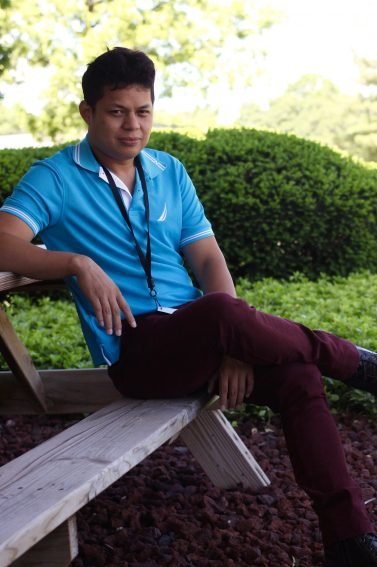
Originally from Burma. Arrived to the U.S. Michigan – 2009, November 10.
No honestly, before I come to US I didn’t not that know about America. I just know that if I go to U.S. I can go to school. I can start my new life. But – just only that I know – that America is the freedom. I used to work with the American people in Thailand, so we know about America. But I did not know, when I arrived to America, that I have to pay my bills or go to school. I didn’t know anything.
Two of my sisters live in America. My older sister lives in Nebraska, in Lincoln. My younger sister in Frederick, Maryland – but not very long. And then I live here in Michigan, Grand Rapids.
I came to U.S. as a refugee, but when I first arrived here I feel, “Oh, I am a refugee. I cannot do anything because I have faced many problems. I cannot speak any – I cannot speak English well. This food, the weather, the environment – everything is new to me. But after one year, I became a permanent resident and I feel oh, now I can travel! But after five years and then I apply, I became a citizen of the United States. And I feel, oh now I am Karen American! I can travel to any country. I am very proud of myself that, you know, now legally I can go to everywhere. But when I live in refugee camp in Thailand, you cannot travel outside the country because we are illegal persons, illegal people. And also, another thing, I got my job here at Bethany as an employment specialist, and then I have a chance to help my refugee friends who are from other countries. From everywhere – not only Burmese Karen people. From other – Nepali, Syria, everywhere.
I would say that 85% I like America. Because it’s a freedom, and as long as you follow the rules you can go – you can do whatever you want. It’s a free country. And you don’t have to be scared of the police, and also you have your freedom of speech. Freedom of expression. Freedom of everything. Freedom of religious. But when I first came to United States, I saw the police and I ran away because I thought oh they would give me trouble. They would give me problems but, “No, no no no – because we try to help you!” My life is changed when I come to U.S. because I can do whatever I want – as long as I follow the rules.
Here we have a Karen community and then we founded a Karen church. And then I just, after nine years – no it’s eight years now – I returned to my home town two times already. The first time I returned to my village 2016, and the second time – I just came back three weeks ago from Karen state. And then my dream is to go back to my country and focus on the education. Because I have seen many kids in the jungle, in the mountains – they don’t have a chance to go school because of the – they are not able to pay the school fee. They have to work for their families. But my dream is, you know, to organize. You know, to try to connect with the other communities and then we do fundraising. We will raise the money. We will support the education of the local people in Karen state. It’s my goals.
Refugee is not a terrorist – I want to say that to the – you know, our president. But sometimes our government right now they don’t like refugee. And that we came as a refugee, mean that we are not coming to just sit and get benefits from the government. We come here, we work very hard, we pay tax, and we do not live for free here. When I compare refugee and the people who are born here, I think we pay tax more than the people who are from here, because we work double. We work overtime. When I look into the company, I will see for the American people who born here and the refugee – the American people usually working 40 hours, but we work 60 hours per week. When you work overtime, you pay more tax! I want to say refugee also support the United States. We follow the rules. But I have heard many times our president say that, “No, I will do America great again” – but if I have a chance, and I wanted to say that you cannot do America great again without refugees. Refugees come here to make America great again, to support the constitution, to follow the rules, pay tax. That’s it.
Mamba
Detroit, MI
“It was not easy for us to be where we are now, because my wife she had been waiting for only getting the interview for three years. So – and last year when Donald – the President, Donald Trump, became the President – that was a critical moment for us because at that time we didn’t even have asylum – both me and my wife. And it was like, the travel ban as I was saying, was like okay so now we need to flee the country. We have to move and then to go to Canada because Canada was trying to open the borders for us. So we are saying, “Okay, the only way we can do is to go.” It was like we fled from Burundi and now we are feeling from United States.”
Photo Credit @joy.bittner
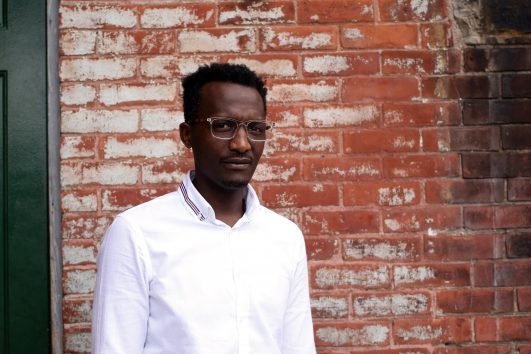
I was born and raised in Burundi – that’s East Africa – and I came in the United States 2 years and a half ago. I reached the airport in New York and I heard someone behind me who was talking, and I thought that he was talking to me. And I was like, “Are you talking to me?” And he said, “No, no, no – I am talking to myself!” That was my first time to see someone talking to himself.
That is one, and then another one is one day we were at a mall – shopping me and my wife. And then someone came, and – a lady. She was about to pay. She was before (me), but then she went back and then she was coming again – so with on the queue, on the line. And then she was like, “Excuse me, Sweetheart!” And I was like – mmhmmmm, what is this? That was shocked me! And then my wife told me, “It’s fine – here everyone is sweetheart!” And I was like ahhh what is this one? I don’t want a problem with my wife, you know? That’s the thing that was impressing…
And the something else was the image we have in Africa for America, especially in Burundi, somehow is different. Back home life is not that big challenging, you know. It’s easy. If you compare, this is something you can tell someone in Africa that in Africa life is easier than here. He can’t understand! For example, if I have a good family I can have a good job without doing an exam or an interview. I can open a business without doing nothing. But here you have the process. It doesn’t matter who’s your parents or – you have to went through all those programs or those process. So that is different. And here time is the time. Because Africa we have all time. If I give you the appointment at 9, if I am there at 10 – it’s fine! You will not blame me. So that is challenging now when we are coming here – we learn!
We have a program, me and me wife now. We started a program to teach, I mean, to go to the elementary schools to talk to people about our journey and how those kids are lucky and they have to be grateful to born here and then to have those access and going to school. Besides that one, you have – I mean, kids in Africa who don’t even have the chance to school and walk like 5 miles to go to get the water! I mean you can’t compare, it is two different things. But problems are everywhere! Problems are what – they are different.
It was not easy for us to be where we are now, because my wife she had been waiting for only getting the interview for three years. So – and last year when Donald – the President, Donald Trump, became the President – that was a critical moment for us because at that time we didn’t even have asylum – both me and my wife. And it was like, the travel ban as I was saying, was like okay so now we need to flee the country. We have to move and then to go to Canada because Canada was trying to open the borders for us. So we are saying, “Okay, the only way we can do is to go.” It was like we fled from Burundi and now we are feeling from United (States). That is the reality people can’t understand! That you don’t have the right in America! That is something sad people don’t even talk about! Many, many people they fled this country to go to seek asylum outside of the United States. So that is the reality of this country. So then after our attorneys told us, “No, it is just new – you have to wait and see how it is going to be.” Fortunately last year, after 4 months, we got our interview and after one month, we had asylum.
Being – I think sometimes for us – we do things because we don’t have any choice, because we have to do that. So what I am proud of is because I can now talk in English. I can talk to you, because when I came 2 years and a half ago I couldn’t even speak. You know, I was like listening and watching cartoons with my girls. And from there, that is how I learned – I didn’t go to school. You have to learn because you have your goals, you have to raise your kids. And then you want a better life for them… So how am I going to give them the example to improve in something when I are not improving now? So you know, one day I will tell them that I was able to learn in nine months the language, so you don’t have an excuse to (not) learn or to achieve something. So I was like, okay, I have to do that! Yeah.
My hope is to be American citizen, yeah because if you are an American citizen you are stable. In any way, if something happen to you, you are making sure that America can come to save you to help you, which it doesn’t exist in many countries.
ADam
DEARBORN, MI
“I want to gain experience in my work as much as I can. I want to get promoted. I want to, you know, I want to rebuild my life somehow. Definitely, all the time I try to like integrate with the community as much as I can. And honestly, even though the media is just showing like – I hear some news like some people are not really welcoming, I never experience any of this. Not most – all of the people I have met here, they are very nice people. They are welcoming. They are helping. I even receive help more than what I expect actually.”
Photo Credit @joy.bittner
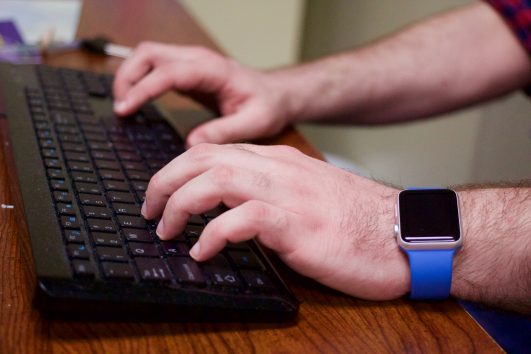
Originally, I am from Syria. I arrived in September of 2016 – so it’s been like about 2 years. Yep, and basically I was located – when I arrived, I stayed in Dearborn. I still live in Dearborn since I arrived.
Dearborn, I believe it’s a nice city and people are welcoming here. I like the city, and yeah I am happy to live here.
I met a lot of new friends. Some of them just from the community, the Syrian community. Some of them I met through some other non-profit organizations. There are like several organizations who helped me when I arrived initially here. So I met some friends who works in these organizations. They help me to – I mean to write my resume in the U.S. style. They help me to do some like mock interviews. They introduce me to a new people who work in the same – I mean, in the same field as my studies, so yeah.
I did something called ECE – its Educational Credential Evaluation. So ah they just evaluated my degree, and that’s it – it’s already been evaluated as a master degree in the same level as the United States credentials. For, for – I mean in the IT field, it’s a bit easier. It’s not that complicated, the process I mean, to evaluate the degree.
Okay, socially like meeting the people and talking with people, the places I visited, it’s the same way I pictured it before I arrived. The same way I saw the TV shows, the movies, like most of this – it’s been the same. I was just shocked by the way that the entire immigrant status happened. I always thought about the U.S. as the greatest country on the planet, so I didn’t think that one person could affect the entire system this way. That’s the point where I just got like – I didn’t get it really. I didn’t understand like how this happened, yeah.
What I really like about here, like you know, when you work – you can establish something. You can build something. As long as you are like proactive, you do your job, you just work hard – even sometimes not really that hard.. Just do your work – you will build something! You will build your current time, you will build the future. What I am proud about that I – in not really that long time – I was able to get a job in something related to my, I mean, background studies. I am happy that I am building something.
I want to gain experience in my work as much as I can. I want to get promoted. I want to, you know, I want to rebuild my life somehow. Definitely, all the time I try to like integrate with the community as much as I can. And honestly, even though the media is just showing like – I hear some news like some people are not really welcoming, I never experience any of this. Not most – ALL of the people I have met here, they are very nice people. They are welcoming. They are helping. I even receive help more than what I expect actually.
If you want really to know about refugees, or immigrants, or any – even you want to know about your neighbor – you don’t need to learn about it from the other neighbor. Try to interact with that person and see if you like his reactions, if you like his actions. Then you can do your own judgement. Don’t listen to somebody who is telling you, “That neighbor is not good.” Just go and interact with the person. See maybe you love him – maybe you will just say, “No, they are not a good people.” But honestly, don’t listen to the media.
BANZA
Grand Rapids, MI
“The 15 years I spent in a refugee camp, it was like a bandage… We had a vision, because I didn’t give up even though I was in a refugee camp but I was dreaming saying one day God will put me somewhere. We lived hopeless because everything was no freedom. You can’t do anything. No job. So the five years that I am in the United States I see progress. It’s progress – even challenges, but it’s okay, it’s just to see how you can overcome and make everything together and then keep going. So I would say the five years are the five years of new experience. It is the five years of a dream.”
Photo Credit @joy.bittner
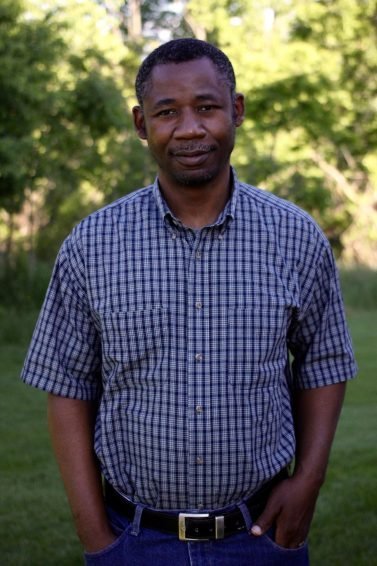
Originally I am from Congo. I am here in the United States 6 years now, since 2012.
The 15 years I spent in a refugee camp, it was like a bandage. Yeah, everything was hard and desperate, and no… We had a vision, because I didn’t give up even though I was in a refugee camp but I was dreaming saying one day God will put me somewhere. We lived hopeless because everything was no freedom. You can’t do anything. No job. So the five years that I am in the United States I see progress. It’s progress – even challenges, but it’s okay, it’s just to see how you can overcome and make everything together and then keep going. So I would say the five years are the five years of new experience. It is the five years of a dream.
You know when we are in Africa, people have a lot of expectation, just saying something – maybe its kind a dream. People are dreaming, but you know when we came in the United States the reality was different. We expect maybe when we will be in the United States you can work. Maybe you can have money everywhere. They can give you money for free and support everywhere – they can support as we expected when we were in our country, or when we in the refugee camp. Some people they didn’t even work in factories or big companies. Some people they didn’t drive in Africa. So when they say three months and you are self sufficient, it is a big problem for us. Some people they just – yeah, they are discouraged to live and some they have a stress, trauma, depression because of that. Some people you can find a good job when you just come, and some very very hard – very bad. Like myself, the first year was a very bad year for me, because I struggled a lot. We didn’t have a job and then I was working far away – 45 min and the job was just a meat company. It was a physical job, so it was very hard for me the first year.
I am a pastor from – I was ordained as a pastor since Africa. It is not here, I was a pastor since my country. And then I came with everything and my document and ordination paper, something like that… I showed them, so they recognized me but it took me a long time – almost 4 years so to recognize me as a pastor. So it was not easy. I told them I said, “Yeah, I am a pastor. I am not a pastor because of a document or a certificate or something. It is a gift God gave me as a pastor and I will continue to work, and I don’t care about anything but I will still do my best to work for God.”
I started a church in my house in the basement with my family. Just we – we just set up time to pray and people heard about us and then they came and join us day by day. One family, two family – and then the basement was very small, and that is why I decide now to have a – to look somewhere we can just worship. So it was not easy, but you know what we are doing it is not – you can put your effort, but there is a God who help us because it is very hard for you to just bring people, to call people… Especially here in the United States! In Africa we do what we call gospel. So gospel you can go outside and just start preaching and people comes! But here, I never seen that before – people across the road or where is somewhere just preaching. I don’t know, maybe some cities, but here I’ve never seen that. So it is a little harder and it is very complicated. But yeah, I started like that and God helped me so much and just give me strength. And yeah, so the church grew up and now is – is growing up. We are almost to 200.
Since I left my country, now it is almost 20 something – 20 years. Yeah, so I miss so much my country. I miss my friends, you know. I went to school. I have a friends I have been with them at school. I have siblings, I have my sisters there in my country. There is something we call in French nostalgie. I think this word is in English too – nostalgie? Last time I went with David in Travel City – Travel City, so I was to the bay. He took me to the bay, I don’t know, in the beach. So when we got there, I just looked at – I don’t know if it is a lake? Yeah, but it reminded me of my country so much because we have those kinds of lakes. Yeah, so I miss so much my friends, my brother, siblings, and for all my children – they don’t know my country. So the oldest, when we left our country she was 1 years (old). Yeah, she grew up in a refugee camp in Tanzania. The three, the three – the rest of the three – they were born in a refugee camp. They don’t know even Congo. They don’t know my country. So that makes me sometimes, makes me sometimes to feel like – I want them just to know when I came from. It is good, it is better to know where I came from. Even though now I am U.S. citizen, but I want them to know my roots.
Dhan
Grand Rapids, MI
“There is always that unseen difference that exists between being a United States citizen versus not being a United States citizen. So once you become the United States citizen – it is kind of an assurance for us. Like for refugees, I mean, we were thrown out of the country, and then again from the refugee camp to this country. And there is that little fear inside us – okay we are next. Are we getting thrown out of this country also? So once we get this citizenship, we are kind of assured that okay, now this is our place. This is my country, and that makes me very proud.”
Photo Credit @joy.bittner
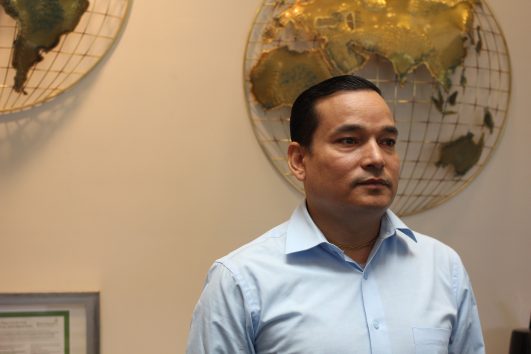
“I am originally from Bhutan – it’s a country between India and China – and I have been in the United States for about eight and a half years now.
I never thought, and let me very frank with you, that I never thought that I would get this type of friends and welcome here in the United States when I came first, because when I left my country, Bhutan, and came to Nepal, you know we didn’t get a good treatment there as refugees from the surrounding neighbors. So my understanding was okay, the people who looked exactly like us and followed the same culture and spoke the same language treated us this way, so we are going to this country where the culture is totally different, people look totally different from me… What would be the treatment like? Was a big question mark for me, but when I came I found out that that was totally different. People were welcoming. Everybody that I met during that time had a question, and the question is, “How can I help you? Are you okay? How are you doing? Do you have this? Do you need a vacuum? Do you need this?” You know, they were very very helpful. And since I got resettled through Bethany and then I was co-sponsored by a church, I got to see church people and make lots of church friends. I don’t know if that is why I felt the way I felt… but yes, I was very impressed by how I welcomed and how I was treated here in Grand Rapids.
So some of the things that I am really proud of is – number one being education for my kids. My daughter, she just graduated from high school. My son graduated in 2014. We are homeowners. We own homes. We are very very proud United States citizens. So that’s what make me feel very very proud about, because I was stateless – belonged nowhere – for about 27-28 years. You know, I couldn’t say I was from Bhutan, because I was thrown out of the country. I was in a refugee camp in Nepal. I wouldn’t say I was from Nepal, because I was just taking refuge there in that country. And then I come to America, and still I couldn’t say I was American because I was not a citizen here in the country. And then finally in 2015, I passed the citizen test and became a citizen of this country. And that makes me and my country so proud, that we are now citizens of this great nation and we feel like we belong somewhere as opposed to statelessness. Now I have hope and dreams, and that makes me very happy.
There is always that unseen difference that exists between being a United States citizen versus not being a United States citizen. So once you become the United States citizen – it is kind of an assurance for us. Like for refugees, I mean, we were thrown out of the country, and then again from the refugee camp to this country. And there is that little fear inside us – okay we are next. Are we getting thrown out of this country also? So once we get this citizenship, we are kind of assured that okay, now this is our place. This is my country, and that makes me very proud.
So looking forward though – for myself and our family – we would like to see ourselves and all our kids having university education. And for us, we would like to have a little bit better house, you know buy a different house. And then be integrated fully into this American society and live a life peacefully – that’s what we are aiming at.”
TATA
Grand Rapids, MI
“In America – in the beginning we have many stress, you know, because I remember one week, I didn’t take a good sleeping because thinking about my country. How long this period going to be? Coming here, you become as somebody who has nothing, you know. Down. From zero to begin a new life. It’s not good, but that’s the reality. Yeah, I miss my people. I miss my house. I miss my job. I miss so everything so, but it’s the way of God too. I am thinking one day it’s going to be correct. One day. I hope.”
Photo Credit @joy.bittner
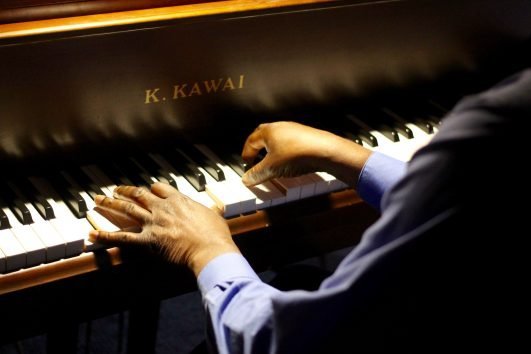
Yeah, I am from Democratic Republic of Congo, DRC. I have been here two years a couple of months.
I have a dream – I like to sing with kids. I like to sing with youth, you know, young men. Music is my blood. If I stay here in the United States, I need to get a studio to record my music. That’s my goal. To have a studio, finding some material – professional material, audio and a video.
This year, I should be at Europe because there are some friends and many people who called me to go to play music, but I can’t, you know.
In America – in the beginning we have many stress, you know, because I remember one week, I didn’t take a good sleeping because thinking about my country. How long this period going to be? Coming here, you become as somebody who has nothing, you know. Down. From zero to begin a new life. It’s not good, but that’s the reality. Yeah, I miss my people. I miss my house. I miss my job. I miss so everything so, but it’s the way of God too. I am thinking one day it’s going to be correct. One day. I hope. I hope it.
My first goal here now right now, I am making some effort to have the master of this language. The language is the way to open many doors, you know. That’s I am making effort to have the master of this language and go knocking every doors, yeah.
